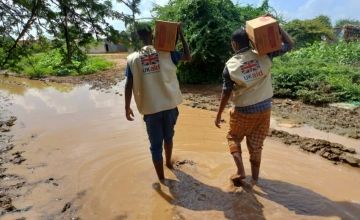
Read our 2023 annual report

Knowledge Hub
Devastating floods leave over 100 dead and 1.4 million homeless in Somalia

Concern Worldwide’s team in Somalia are responding to the worst floods in 35 years, which have killed 110 people, forced over 1.4 million to flee their homes, and caused widespread destruction to agricultural land and vital infrastructure.
“Somalia was brought to the brink of famine last year following the worst drought in 40 years. That has now been followed by once -in-100- years flooding. The impact has been colossal,” Concern’s Emergency Country Coordinator Joshua Pollard said.
The El Niño super charged the October-December rainy season to produce intense rain, which resulted in flash floods and river flooding. Some areas received 300 mm in seven days – the equivalent of the entire October-December season.
The floods forced people from their homes, left other communities cut off, and severely damaged roads and bridges.
Concern’s team are using boats, tractors, and donkeys and carts to reach communities.
Acute food shortages
“Some 2.4 million people have been impacted and it’s expected that a quarter of the population – over four million people – will face acute food shortages in the coming weeks,” Mr Pollard said.
Concern’s teams and local partners are providing health and nutrition supports, mobile and static health clinics, hygiene kits, mosquito net, water supports and emergency cash distributions.
They are supporting 500,000 people through health and nutrition supports and aim to have reached 100,000 people with emergency cash payments by the end of next month.
Concern has worked in Somalia since 1986 and has long established relationships with communities and works closely with local partners YouthLink, Lifeline Gedo, Shabelle Community Development Organization, Gargaar Relief and Development Organization to reach those hardest hit by the floods to deliver lifesaving and development activities.
Risk of disease
“There is a major risk of disease in the coming weeks and months, due to the large amounts of stagnant water,” Mr Pollard said. “Already reported cases of Cholera are 56% higher than the three year average. Stagnant water is ideal breeding ground for mosquitos with the subsequent risk of malaria and dengue fever.”
Funding for the response has been provided by a number of donors including Irish Aid, the World Bank, IOM, the UK’s Foreign, Commonwealth & Development Office, and the EU’s ECHO.
“It is going to be a very challenging year ahead, with the humanitarian needs expected to far outweigh the funds available,” Mr Pollard said. “We have to work now to help people make an early recovery. But long range weather forecasts indicate that we may face an El Niño-charged wet season from April to June, leading to further flooding by the middle of 2024.”
For media queries or to arrange an interview contact Eamon Timmins, Media Relations Manager, Concern Worldwide, at 087 9880524 or eamon.timmins@concern.net
Other ways to help
Corporate support
Is your company interested in working together for a common cause?
Fundraise for Concern
From mountain trekking to marathon running, cake sales to table quizzes, there are lots of ways you can support our work.
Buy a gift
With an extensive range of alternative gifts, we have something to suit everybody.
Leave a gift in your will
Leave the world a better place with a life-changing legacy.
Volunteer with Concern
The lots of ways to get involved with our work as a volunteer
School fundraising
Without the generous support from schools, we wouldn't be able to do the work that we do.

